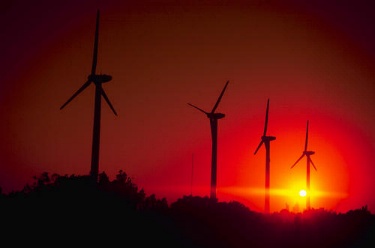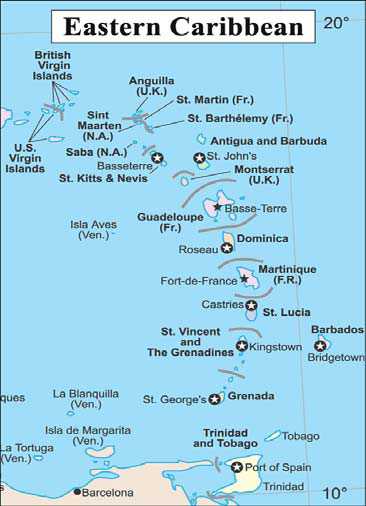Tiempo Climate Cyberlibrary
Global Sustainable Energy Islands Initiative
 |
Tom Roper outlines a global initiative aimed at
supporting renewable energy and energy efficient
projects as well as national energy plans in small
island states.
The author is project director of the Global
Sustainable Energy Island Initiative and is also a
board member of the Washington DC-based Climate
Institute.
|
The forty-three members of the Alliance of Small Island
States (AOSIS) are among the most vulnerable to global
climate change with its accompanying sea level rise and
increased extreme weather events.
Most Small Island Developing States are already
ill-equipped to deal with their existing environmental
problems, such as coastal and coral degradation, explosive
population growth, over development and pollution. These
problems will worsen as the impacts of land submergence,
beach erosion, coral damage and storms take their toll.
Climate change threatens the very existence of many
AOSIS members even though they are the innocent, the
smallest emitters of greenhouse gases. Nations such as the
Maldives, Tuvalu and Kiribati are just a few metres above
sea level.
Compounding the challenge of global warming, most Small
Island Developing States struggle with expensive and
sometimes unreliable fossil fuel imports. Diesel is the
dominant source of electricity, at least for those with it,
and can cost as much as US40 cents/kWh. Seventy per cent of
Pacific Islanders, however, still do not have access.
|
 The Small Island States can, by
promoting a clean energy environment, set an example
for the rest of the world. Too much of our national
budgets are spent on fossil fuels for diesel
generation of electricity. This is a drain on our
economies and does not work towards a solution to the
problems of climate change. When the tanker comes in,
the foreign reserves go out. Far too little attention
has been given amongst the Small Island States
leadership and by the donor countries to the
development of alternative means of energy. The Small Island States can, by
promoting a clean energy environment, set an example
for the rest of the world. Too much of our national
budgets are spent on fossil fuels for diesel
generation of electricity. This is a drain on our
economies and does not work towards a solution to the
problems of climate change. When the tanker comes in,
the foreign reserves go out. Far too little attention
has been given amongst the Small Island States
leadership and by the donor countries to the
development of alternative means of energy.
The Honourable Neroni Slade,
former chair of AOSIS and Samoa's then Ambassador
to the United Nations
|
Fortunately, though, the need for change has coincided
with the greater affordability and availability of
alternatives to fossil fuel. The cost of renewable energy
has come down dramatically. Small Island Developing States
are especially suited to utilize combinations of modern
renewable energy technologies and energy efficiency
measures.
Finding an international solution
Some years ago, Ambassador Slade challenged the Climate
Institute, a Washington DC-based non-governmental
organization, to work with AOSIS to find energy
solutions.
As a result, the Global
Sustainable Energy Islands Initiative (GSEII) has been
organized to support Small Island Developing States and
potential private investors and donors by bringing
renewable energy and energy efficiency projects, models and
concepts together into national sustainable energy plans.
The GSEII, a consortium of international non-governmental
organizations and multilateral institutions, seeks to
showcase national efforts that significantly reduce
greenhouse gas emissions.
The Global Sustainable Energy Islands Initiative was
launched with a grant from the Rockefeller Brothers Fund. This
grant enabled the consortium to initiate sustainable energy
plans and policies as well as communications and outreach
in three Caribbean countries - St Lucia,
Grenada
and Dominica - as
well as other AOSIS nations.
The United States
Department of Energy and the Turner Foundation
were also initial supporters of GSEII.
The United
Nations Foundation has enabled the consortium to
advance projects in these three island nations as well as
to expand activities to other island nations within the
Caribbean and the Pacific. This grant will also help in
identifying and developing financing for replication in the
region. The United Nations
Industrial Development Organization is the executing
agency and partner.
|

|
© GSEII
|
More recently, the consortium has also received support
from two new funders - the United States Agency for
International Development and the Renewable Energy and Energy
Efficiency Partnership.
The Organization of American States, a consortium
member, has also obtained support from the Global Environment Fund and the United Nations Development
Programme to develop a pre-feasibility study for
geothermal resource assessment in Dominica, St Lucia and
St Kitts
and Nevis.
|
The GSEII Consortium
The Climate Institute is a
non-profit organization founded in 1986 to serve as a
bridge between policy makers and scientists around
the world, as well as between developed and
developing nations. The Institute promotes
cooperative international action to address climate
change. Contact: nkhattak@climate.org
Counterpart
International, set up in 1965 as the Foundation
for the Peoples of the South Pacific, is involved in
the successful rural energy programme in Kiribati. It
works with island communities in the areas of
capacity building, sustainable energy, climate
change, biodiversity, marine resource management and
environmental protection. Contact: info@counterpart.org
The Energy and
Security Group assists clients to address
critical energy and natural resources issues at the
nexus of national and international security
interests. The Group promotes the use of
environmentally-responsible energy solutions through
the following business services: energy security
analysis; project support; financial engineering;
policy support; and technical assistance and
training. Contact: judy@energyandsecurity.com
The International Network for
Sustainable Energy (INFORSE) is a European-based
global network of independent non-governmental
organizations working for sustainable energy
solutions to reduce poverty and protect the
environment. INFORSE is a worldwide network
consisting of over 140 non-governmental organizations
working in over 60 countries. Contact: ove@inforse.org
The Organization of American
States is a multi-lateral organization for the
nations of the Americas and currently serves as the
coordinating institution for the Renewable Energy in the
Americas initiative, which offers technical,
policy and financial assistance for the promotion of
sound energy solutions throughout the region.
Contact: lambrides@oas.org
Winrock International is
a non-governmental organization working with people
around the world to increase economic opportunity,
sustain natural resources and protect the
environment. Winrock's Clean Energy
Group is a recognized leader in the field of
clean energy and operates a multimillion dollar
programme, including Renewable Energy Project Support
Offices in ten countries. Contact: jpg@winrock.org
|
The GSEII strategy
To accelerate the transition of AOSIS member nations
toward cleaner, more sustainable energy use, the GSEII
employs the following approach to both broaden and deepen
sustainable energy development activities:
- work with partner countries on the development and
implementation of Sustainable Energy Plans, with
quantifiable targets and timetables;
- identify and mitigate policy, financing, technical
and institutional obstacles and bring about changes in
the marketplace that will enhance the viability, profile
and replicability of clean energy projects;
- work with utilities to enhance their capacity for
renewable energy planning and help transform these
utilities from diesel-based generation to renewable
energy systems;
- catalyse private investment in renewable energy (such
as biomass, geothermal, hydropower, photovoltaics, solar
thermal and wind technologies) and energy efficiency
opportunities;
- build and strengthen local capacity at national and
regional levels to continue to develop and implement
sustainable energy options and approaches; and,
- demonstrate that energy can be used as a tool for
sustainable development and poverty reduction, thereby
contributing to attainment of the Millennium Development
Goals.
The challenge
Though Small Island Developing States are especially
suited to utilize combinations of modern renewable
technologies and energy efficiency due to the availability
of renewable energy resources and current energy
consumption patterns, there are difficulties in achieving
this potential.
Most Small Island Developing States lack technical
knowledge and skilled personal, and there are still too few
successful demonstration projects that can be seen and
touched.
Utilities depend on diesel, and their staffs have little
or no experience of renewables or access to resource
assessments. The Maldives, for instance, at the time of
initiating plans, had no engineer with renewable energy
expertise.
In addition, renewables often have a high upfront cost,
while utilities suffer from a scarcity of finance.
The Cabinet of the beautiful Caribbean nation of St
Lucia was the first to approach GSEII for assistance.
Working with the government, utility,
business and the community, a comprehensive
energy plan has been prepared and adopted by the
Cabinet. The aim is to have renewables account for new
capacity, replace outdated diesels and encourage energy
efficiency.
Dominica and Grenada have joined the project and jointly
announced
their ambitious targets at the World Summit in
Johannesburg.
|

|
© GSEII
|
Dominica's former Prime Minister, the late Pierre
Charles, said "my country, known as the Nature Island
of the Caribbean, has long embraced the principles of
sustainable development and sees clean energy as a
fundamental requirement for economic and social
progress." The national target, building on existing
33 per cent use of hydropower, aims to achieve 65 per cent
renewable energy use by 2010.
"Our dependence on expensive foreign energy has
done nothing to help development or deliver affordable
energy to the poor. Small Island States need support from
developed nations to succeed in their energy plans -
technical assistance, new technologies, soft financing and
joint venture partners," he added.
|
Requirements for developing
national sustainable energy plans
- Set up a National Working Group on Sustainable
Energy
- Adopt targets for energy transformation
- Carry out resource assessments
- Identify renewable energy and energy efficiency
projects
- Remove barriers, including legislative, to
commercialization
- Obtain approval and involvement by the
Government and other stakeholders
Success will require capacity
building, community education and awareness
campaigns, and the sharing of experiences with other
regions and islands. It will also need hitherto
scarce donor, international bank and private sector
investment.
If success is not achieved, there is
a real risk that most Small Island Developing States
will miss out on opportunities for the sale of carbon
offset credits through the
Clean Development Mechanism.
|
The GSEII five-year sustainable energy plan
As a result of assessing the immediate energy needs of
the small islands, the GSEII developed an ambitious
five-year plan.
The fundamental aims of the plan are to assist several
Small Island Developing States that are members of AOSIS in
achieving energy independence and thus to serve as
successful models for the rest of the world.
The GSEII's strategies and plans run from 2003 to
2008. It is expected that the following outcomes will be
achieved as a result of implementing this five-year
plan:
- approved National Sustainable Energy Action Plans by
over twelve Small Island Developing States;
- enhanced capacity for national energy planning and
renewable energy/energy efficiency policy
implementation;
- commitment and/or leverage of US$100 million in
investment in renewable energy/energy efficiency projects
and enterprises;
- initiation of energy efficient projects in government
facilities, commercial, residential and industrial
sectors, especially in the hotels and tourism
industry;
- initiation of fifteen new projects in the AOSIS
member nations and plans for at least 100MW of clean
energy projects (new and renewable energy projects or
equivalent savings through efficiency measures)
facilitated with corresponding greenhouse gas emissions
reductions;
- enhanced capacity for renewable energy and efficiency
at a regional level and among all 43 members of AOSIS;
and,
- catalysing the interest of other bigger nations to
follow the Small Island Developing States example.
Initial successes
The Fiji Department of
Energy has, amongst other initiatives, developed a
village-based hybrid wind, solar and diesel scheme, and
provides mini hydro and coconut oil options elsewhere. The
Fiji Electricity Authority is negotiating for a major wind
power investment to service the grid.
Encouraged and assisted by the Pacific Power Association, the
ocean-wide regional electric utilities organization, five
Pacific nations and the European Union are finalizing
individual country sustainable energy projects.
Elsewhere, the Unit
for Sustainable Development and Environment of the
Organization of American States is executing a Global Environment
Facility project to support geothermal energy
development in the Eastern Caribbean.
|

|
© GSEII
|
The
Eastern Caribbean Geothermal Development Project
(Geo-Caraïbes) seeks to catalyse commercial geothermal
energy projects in St Lucia, Dominica and St Kitts and
Nevis with the expectation that regional power independence
will contribute significantly to the economic and
environmental sustainability in the region.
Geo-Caraïbes intends to achieve this goal by
supporting market reforms that improve the market
conditions for geothermal power in these countries. The
following are the main avenues of support:
- establishing a transparent pro-active and
commercially-sound geothermal policy and legal
environment;
- furthering geothermal resource/technical studies for
commercial investment pre-selection;
- conducting the technical evaluation and establishing
the institutional arrangements for the export of
geothermal power to Martinique
and/or Guadeloupe;
- creating a US$10 million Eastern Caribbean Geothermal
Energy Drilling Risk Fund; and,
- organizing a process to attract/negotiate with world
class geothermal project developers to invest in
projects.
It is expected that a large quantity of geothermal
energy capacity (60-120MW) will be developed and that the
resulting power will offer the host countries a low-cost
power solution. At the same time, this will enable them to
generate substantial income as an export to Martinique
and/or Guadeloupe via submarine electricity transmission
cables.
In St Lucia, Grenada and Dominica, the GSEII has
assisted in developing National
Sustainable Energy Plans as well as preparing projects
for investments. As a result of these plans, and working
closely with local utilities and private sector
entrepreneurs, a number of projects have been identified.
GSEII and its partners are providing technical assistance
in further development and implementation of these
projects.
|
Ongoing projects
and projects to be implemented
through the 2004-7 period
|
|
St Lucia
|
- St Lucia Electricity Services Point de Caille
4.25 MW Wind Farm
- St Lucia Cooperatives League and Credit Unions
Solar Hot Water Heating Financing Program
- St Lucia Ciceron Landfill Gas to Energy
Project
- Poultry Litter to Energy Project
- Sulphur Springs Geothermal Project
- Energy Efficient Lighting Project
- Energy Audits and Training Project for Hotel
Industry
- Energy Efficiency and Renewables Awareness
Campaign
|
|
Grenada
|
- 225 kW Wind Turbine on Carriacou island
- Grenada Nutmeg Shell to Energy Project
- Grenada Cooperatives League and Credit Unions
Solar Hot Water Heating Financing Program
- Energy Efficient Lighting Project
- Photovoltaic system for Grenada Chocolate
Company energy supply
|
|
Dominica
|
- Large Scale Geothermal Project Pre-feasibility
Development
- Energy and Power Losses Reduction in DOMLEC
Distribution System
- Dominica Cooperatives League and Credit Unions
Solar Hot Water Heating Financing Program
- Pilot Phase for a potential 4MW Wind Farm
- Dominica Electricity Services Micro Hydro
Project
- Energy Efficiency Lighting Project
|
GSEII will also work with the local governments and
project developers on the development and packaging of
projects for carbon financing through the Clean Development
Mechanism, the Prototype
Carbon Fund and other sources.
These efforts will be coordinated by the GSEII by
working closely with existing regional organizations and
multilateral initiatives. These include the Caribbean
Renewable Energy Development Programme, the Organization of Eastern Caribbean
States, the Caribbean Energy
Information Systems, the United Nations Development
Programme and the Global Environment Facility.
|
 Clearly, the element of urgency to
switch to efficient, affordable and renewable energy
sources is real. Whilst in global terms the energy
use in small island states is small, and their
polluting-emissions minimal, the AOSIS countries have
shown many a time that they stand ready to do their
part to contribute to the reduction of global
emissions through the promotion of renewable energy.
Every contribution counts, however small. Our
interest in moving the global economy towards less
carbon intensive is not self-serving, for the
consequences that we are first to encounter will
surely be felt by others. Clearly, the element of urgency to
switch to efficient, affordable and renewable energy
sources is real. Whilst in global terms the energy
use in small island states is small, and their
polluting-emissions minimal, the AOSIS countries have
shown many a time that they stand ready to do their
part to contribute to the reduction of global
emissions through the promotion of renewable energy.
Every contribution counts, however small. Our
interest in moving the global economy towards less
carbon intensive is not self-serving, for the
consequences that we are first to encounter will
surely be felt by others.
Ambassador Enele Sopoaga of
Tuvalu, Vice Chairman of AOSIS,
speaking at the 12th Pacific Power Association Annual
Conference, July 2003
|
In conclusion
The GSEII partners aim to continue their Caribbean work,
possibly adding additional nations, and to help develop
sustainable energy plans for Pacific and Indian Ocean
countries. The United Nations-sponsored review meeting of the 1994 Barbados
Plan of Action to be held in January in Mauritius provides
an excellent opportunity for the showcasing of successful
demonstration projects.
We must show the Mauritius participants and the
international community that sustainable energy is not only
an environmental necessity, but also makes economic and
social sense.
Further information
Tom Roper, Climate Institute, 1785 Massachusetts Avenue NW,
Washington DC 20036, USA. Fax: +1-202-5470111. Email:
troper@nyc.rr.com.
Web: www.climate.org.
On the Web
Further information concerning the review of progress in
implementing the Barbados
Programme of Action for the Sustainable Development of
Small Island Developing States can be found at the conference
website. The Tiempo Climate Cyberlibrary presents a
listing of theme
sites and articles on Small Island Developing
States.
Acknowledgements
Parts of this feature have been extracted from an article
by the author in
New Academy Review.

 The Small Island States can, by
promoting a clean energy environment, set an example
for the rest of the world. Too much of our national
budgets are spent on fossil fuels for diesel
generation of electricity. This is a drain on our
economies and does not work towards a solution to the
problems of climate change. When the tanker comes in,
the foreign reserves go out. Far too little attention
has been given amongst the Small Island States
leadership and by the donor countries to the
development of alternative means of energy.
The Small Island States can, by
promoting a clean energy environment, set an example
for the rest of the world. Too much of our national
budgets are spent on fossil fuels for diesel
generation of electricity. This is a drain on our
economies and does not work towards a solution to the
problems of climate change. When the tanker comes in,
the foreign reserves go out. Far too little attention
has been given amongst the Small Island States
leadership and by the donor countries to the
development of alternative means of energy.


 Clearly, the element of urgency to
switch to efficient, affordable and renewable energy
sources is real. Whilst in global terms the energy
use in small island states is small, and their
polluting-emissions minimal, the AOSIS countries have
shown many a time that they stand ready to do their
part to contribute to the reduction of global
emissions through the promotion of renewable energy.
Every contribution counts, however small. Our
interest in moving the global economy towards less
carbon intensive is not self-serving, for the
consequences that we are first to encounter will
surely be felt by others.
Clearly, the element of urgency to
switch to efficient, affordable and renewable energy
sources is real. Whilst in global terms the energy
use in small island states is small, and their
polluting-emissions minimal, the AOSIS countries have
shown many a time that they stand ready to do their
part to contribute to the reduction of global
emissions through the promotion of renewable energy.
Every contribution counts, however small. Our
interest in moving the global economy towards less
carbon intensive is not self-serving, for the
consequences that we are first to encounter will
surely be felt by others.